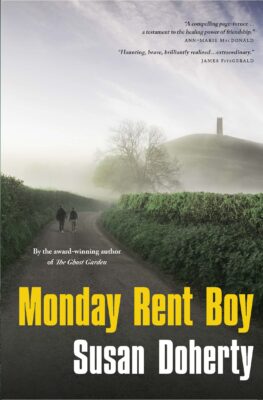In J.M. Coetzee’s 2003 novel, Elizabeth Costello, the titular protagonist delivers a lecture on a novel about a failed plot to assassinate Hitler. The novel – in particular, a scene in which the plotters are captured and gruesomely tortured – disturbs Costello to such an extent that she begins to question the ethics of representing human evil in fiction. “Certain things are not good to read or to write,” she declares before the audience.

Monday Rent Boy
Susan Doherty
Random House Canada
$36.00
cloth
360pp
9781039006553
Doherty toggles between Arthur and Ernie’s perspectives and delves into the characters’ memories of their abuse. At the age of eight, Arthur begins taking private chess lessons with the Zipper each Monday. He recalls, “when the Zipper told me to take off my uniform jackets and pants, I had obeyed, just as I obeyed every other instruction the priest issued, including the Sanctus bells and placing the processional cross into the brass holder on the altar.” The Zipper lavishes Arthur and Ernie with sweets and gifts. All the while, the abuse escalates until Arthur is forced to steal underwear to replace the pairs that have been stained with blood.
While Arthur and Ernie come to realize that they are both “on the Zipper’s assembly line,” they are unable to address the situation with one another. As Arthur reflects, “neither of us was capable of articulating what happened behind that locked door even if we’d wanted to break the silence.” Instead, they progress through adolescence under the shadow of their unspoken trauma.
During this time, Arthur finds solace in the world of literature under the tutelage of local bookseller Miss Philipps. At her urging, he begins to write book reviews and soon finds success on a national scale. Ernie is not so fortunate. He abuses substances and, under the guidance of his older brother, begins to work in a child sex trafficking ring. The novel’s most appalling scenes see Ernie facilitating abuse against young, often orphaned, children, by men “in business, media and entertainment circles. Even government.”
After attempting to sound the alarm about the Zipper’s connection to the child sex trafficking ring, Ernie disappears. In the novel’s conclusion, set in 2008, Doherty makes the case that “the wilful blindness of the church, and the collusion of local powerbrokers in maintaining that cover-up—has contributed to the proliferation of child abuse on the dark web.”
Monday Rent Boy is most successful in its examination of the fraught, complex relationships formed between individuals in the wake of trauma. Doherty’s investment in the quasi-maternal tenderness between Miss Philipps and Arthur is especially rewarding. The novel is also a steadfast testament to the curative, emancipatory powers of literature.
At times, however, characters are prone to not-quite-believable declarations: “Complacent? Is that what you call living like a hermit crab on an empty beach? You are the most admired woman in this town, yet you act like you have no reason to go on!” Elsewhere, the clarity of Doherty’s sentences become compromised by an overabundance of clauses. In a scene in which Arthur is courted by a fellow student at Durham, Doherty writes, “She was blunt, yes, but so non-judgmental that I felt not only disarmed, but strangely alive—definitely attracted—yet all I could muster was a quick shake of my head as I bolted for my residence.”
Above all, it must also be stressed that Monday Rent Boy is a highly distressing novel: it contains repeated and graphic depictions of violence and abuse. Doherty endeavours to capture the heinous reality of her subject matter, but readers deserve a more explicit content warning than what is contained in the synopsis on the back of the book. All the same, Monday Rent Boy is an honourable attempt to give voice to an issue which is all too often silenced. Contrary to Coetzee’s Costello, Doherty suggests that we must address human evil head on if we ever want things to change.mRb






Monday Rent Boy is an amazingly complex and empathetic book. The author grappls with the shame of sexual abuse at every level and I thank her for that. Our society is so blind when it chooses to be. Sexual abuse and violence towards children and women are two areas people are uncomfortable with. Many work hard not to see or hear what not hidden too deeply. Thank you Susan Doherty. I hope your writing is widely read and appretiated.